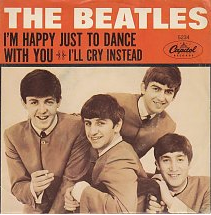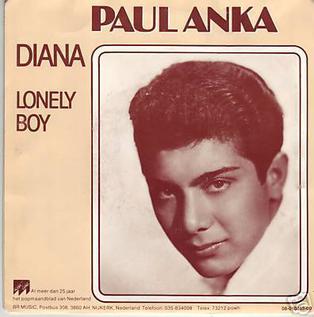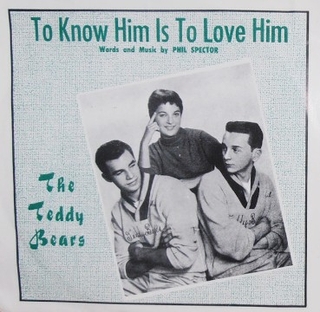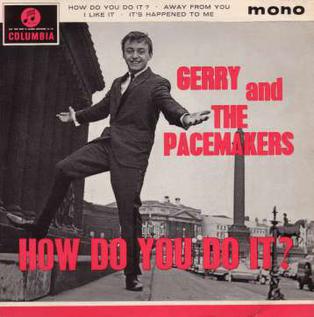
"She Loves You" is a song by the English rock band the Beatles, written by John Lennon and Paul McCartney and released as a single in the United Kingdom on 23 August 1963. The single set and surpassed several sales records in the United Kingdom charts, and set a record in the United States as one of the five Beatles songs that held the top five positions in the charts simultaneously, on 4 April 1964. It remains the band's best-selling single in the UK and was the top-selling single of the 1960s there by any artist.

"From Me to You" is a song by the English rock band the Beatles that was released in April 1963 as their third single. It was written by John Lennon and Paul McCartney. The song was the Beatles' first number 1 hit on what became the official UK singles chart but the second, after "Please Please Me", on most of the other singles charts published in the UK at the time. "From Me to You" failed to make an impact in the United States at the time of its initial release. Instead, a 1963 cover version released by Del Shannon resulted in the song's becoming the first Lennon–McCartney track to enter the US pop charts. The Beatles' original was re-released in the US in January 1964 as the B-side to "Please Please Me", and reached number 41.

Robert Louis Ridarelli, known by the stage name Bobby Rydell, was an American singer and actor who mainly performed rock and roll and traditional pop music. In the early 1960s, he was considered a teen idol. His most well-known songs include "Wildwood Days", "Wild One" and "Volare" ; in 1963 he appeared in the musical film Bye Bye Birdie.

"I Feel Fine" is a song by the English rock band the Beatles that was released in November 1964 as the A-side of their eighth single. It was written by John Lennon and credited to the Lennon–McCartney partnership. The recording includes one of the earliest uses of guitar feedback in popular music.

"I'm Happy Just to Dance with You" is a song written by John Lennon and Paul McCartney and recorded in 1964 by the English rock band the Beatles for the film soundtrack to A Hard Day's Night. Lead vocals are by George Harrison, whose performance in the film marked the first mass media depiction of Harrison singing lead.

"Do You Want to Know a Secret" is a song by English rock band the Beatles from their 1963 album Please Please Me, sung by George Harrison. In the United States, it was the first top ten song to feature Harrison as a lead singer, reaching No. 2 on the Billboard chart in 1964 as a single released by Vee-Jay, VJ 587. In the UK, Billy J. Kramer released a cover of the song as his debut single, reaching No. 1 on the NME singles chart and No. 2 on the Record Retailer chart.

"A World Without Love" is a song recorded by the British duo Peter and Gordon and released as their first single in February 1964. It was included on the duo's debut album in the UK, and in the US on an album of the same name. The song was written by Paul McCartney and attributed to Lennon–McCartney. The B-side was "If I Were You", written by Peter and Gordon.

"Diana" is a song written and first performed by Paul Anka, who recorded it in May 1957 at Don Costa’s studio in New York City. Anka stated in his autobiography that the song was inspired by a girl named Diana Ayoub, whom he had met at his church and community events, and had developed a crush on. Session musicians on the record included George Barnes playing lead guitar, Bucky Pizzarelli playing the "Calypso" riff on guitar, Irving Wexler on piano, Jerry Bruno on bass, and Panama Francis on drums. The song was recorded in May 1957 at RCA Victor Studios in New York. Backup singers included Artie Ripp.

"Take Good Care of My Baby" is a song written by Carole King and Gerry Goffin. The song was made famous by Bobby Vee, when it was released in 1961.

"To Know Him Is to Love Him" is a song written by Phil Spector, inspired by words on his father's tombstone, "To Know Him Was to Love Him." It was first recorded by the only vocal group of which he was a member, the Teddy Bears. Their recording spent three weeks at No. 1 on the Billboard Hot 100 chart in 1958, while reaching No. 2 on the UK's New Musical Express chart. Peter & Gordon and Bobby Vinton later had hits with the song, with its title and lyrics changed to "To Know You Is to Love You". In 1987, the song was resurrected by Dolly Parton, Linda Ronstadt, and Emmylou Harris, whose Trio recording topped the U.S. country singles chart.

"Glad All Over" is a song written by Dave Clark and Mike Smith and recorded by The Dave Clark Five.

"How Do You Do It?" is a song, written by Mitch Murray. It was recorded by Liverpudlian band Gerry and the Pacemakers, and became their debut single. This reached number one in the UK Singles Chart on 11 April 1963, where it stayed for three weeks.

"Just One Look" is a song co-written by American R&B singers Doris Troy and Gregory Carroll. The recording by Doris Troy was a hit in 1963. The Hollies, Anne Murray, Linda Ronstadt and Iain Matthews each achieved great success with the song. There have also been many other versions.

"Roses Are Red (My Love)" is a popular song composed by Al Byron and Paul Evans. It was recorded by Bobby Vinton, backed by Robert Mersey and his Orchestra, in New York City in February 1962, and released in April 1962, and the song was his first hit.
"There! I've Said It Again" is a popular song written and published by Redd Evans and David Mann in 1941. In early 1945, Vaughn Monroe and his Orchestra released Victor 20-1637, which reached the number one position on the Billboard's National Radio Airplay chart for five straight weeks, then no.2 for six more weeks, and a total run of 29 weeks. It finished 1945 as the no. 4 record of the year.
"Good Time Baby" is a song released in January 1961 by Bobby Rydell. The song spent 11 weeks on the Billboard Hot 100 chart, peaking at No. 11, while reaching No. 6 in Australia, No. 6 on Canada's CHUM Hit Parade, No. 18 in the Netherlands, and No. 42 in the United Kingdom's Record Retailer chart.
"Swingin' School" is a song released in 1960 by Bobby Rydell. The song was from the film Because They're Young. "Swingin' School" spent 12 weeks on the Billboard Hot 100 chart, peaking at No. 5, while reaching No. 11 in Flanders, No. 18 in Wallonia, and No. 44 in the UK's Record Retailer chart. Paired with its flip-side, "Ding-A-Ling", "Swingin' School" reached No. 1 in Australia, and No. 2 on Canada's CHUM Hit Parade, co-charting with Ding-A-Ling.
"See the Funny Little Clown" is a song written and sung by Bobby Goldsboro, which he recorded on October 17, 1963 and released on November 18, 1963. In 1964, the song spent 13 weeks on the Billboard Hot 100 chart, peaking at No. 9, while reaching No. 3 on Billboard's Middle-Road Singles chart, No. 10 on the Cash Box Top 100, and No. 30 on Canada's CHUM Hit Parade.
"Clinging Vine" is a song released by Bobby Vinton in 1964. The song spent 8 weeks on the Billboard Hot 100 chart, peaking at No. 17, while reaching No. 2 on Billboard's Pop-Standards Singles chart, No. 14 on the Cash Box Top 100, No. 11 on Canada's RPM "Top 40-5s", and No. 9 on Canada's CHUM Hit Parade.
"My Heart Belongs to Only You" is a song written by Frank Daniels & Dorothy Daniels. Bette McLaurin and June Christy both released versions of the song in 1952. In 1953, the song reached No. 27 on Cash Box's chart of "The Nation's Top 50 Best Selling Records", in a tandem ranking of June Christy, Bette McLaurin, these versions were marked as bestsellers.













